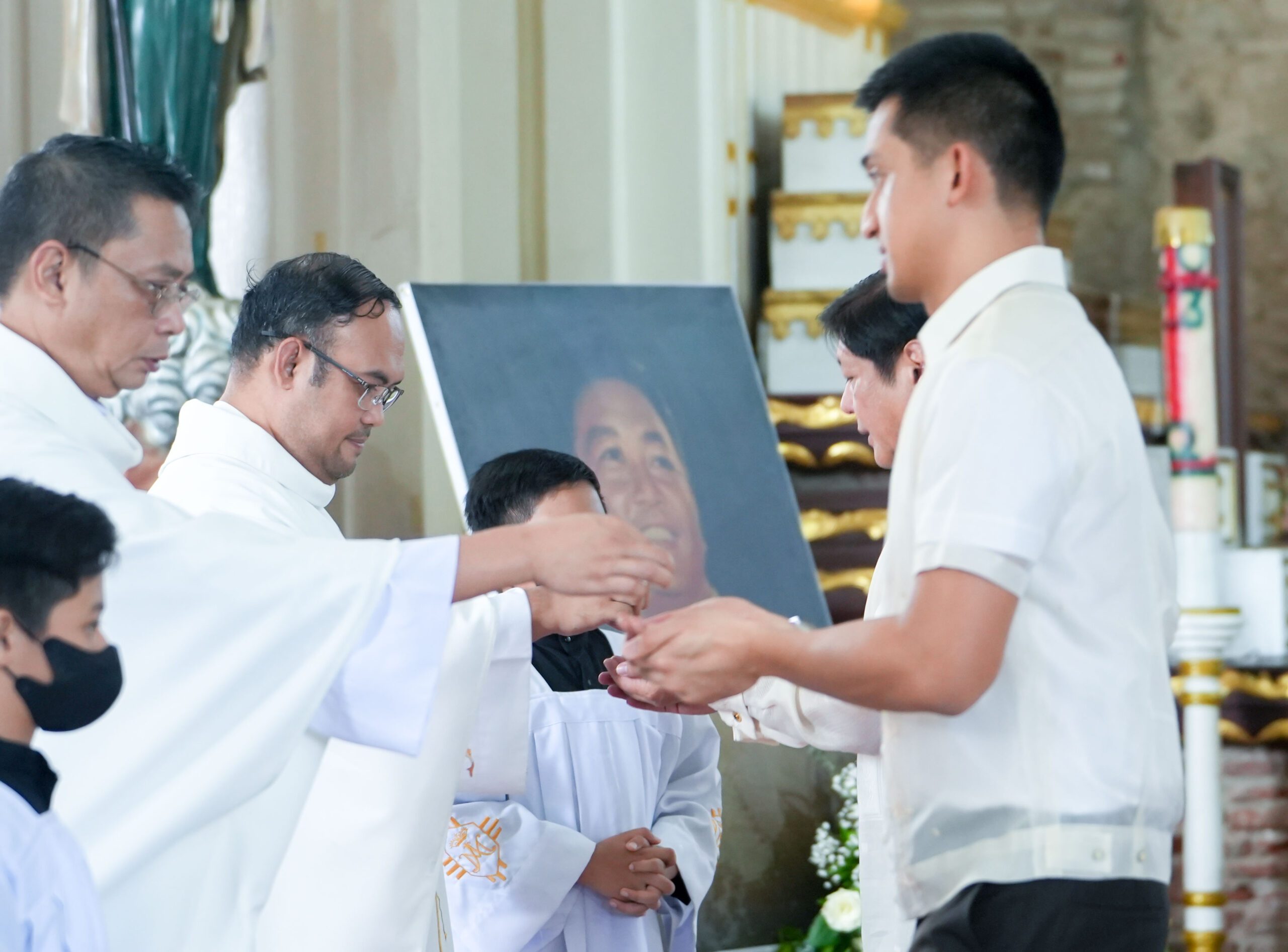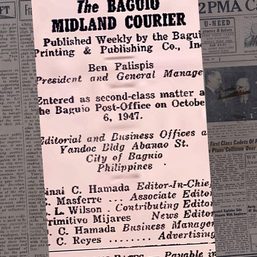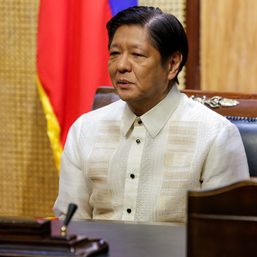SUMMARY
This is AI generated summarization, which may have errors. For context, always refer to the full article.

Surrounded by fellow Ilokanos, including the chiefs of the country’s military and police forces, President Ferdinand Marcos Jr. on Monday, September 11, paid tribute to his father and namesake, the late dictator Ferdinand Edralin Marcos.
September 11, the birth date of the late dictator, is a holiday in Ilocos Norte, through an order from Malacañang itself. A day can only be declared a special non-working day through Congress or the President. Ilocos Norte and its nearby provinces and regions are known in political and electoral circles as the “Solid North,” famous or infamous for being a stronghold of the Marcos clan and their allies.

“Allow me to thank each of you – officials, residents, and guests alike – for taking the time out of your day to celebrate with us and to honor my father. For the peace and order that he fought and stood for, the development that he inspired our own citizens to build, and the dreams that he left in the hearts of many, he remains a true Filipino and Ilocano icon whose exceptional mind matched the nation-loving spirit that he possessed and that he demonstrated,” said Marcos at an event to commemorate his father’s birth in Batac, Ilocos Norte.
Marcos Sr. has been a recurring figure in the second Marcos presidency – either intentional or incidental.
Malacañang has made a point to include the “recreation” of images from the first Marcos presidency, in events that the current Marcos president attends. He’s recreated a photo taken at the rice fields of the International Rice Research Institute, and remade a photo when he signed the new agrarian emancipation act.
Several of his appointees, as in those who aren’t his relatives, also have ties to the first Marcos presidency. That the heads of the military and police are also from the “Solid North,” is an echo of his namesake who used to run things.
“So as we remember and pay tribute to his memory, let this gathering serve as a testament to the unwavering pursuit of unity that he so passionately espoused for our people,” said Marcos, referring, too, to his 2022 campaign slogan.
That President Marcos mentions “unity” in speaking about his father is certainly ironic.
Marcos history
Marcos Sr., elected in 1969, held on to power for nearly two decades. The late Marcos elder declared Martial Law in 1972, citing supposed destabilizing threats to the nation – this, despite a report from then-executive secretary Alejandro Melchor and military aide Jose Almonte stating that “while Martial Law may accelerate development, in the end the Philippines would become a political archipelago, with debilitating, factionalized politics.”
Almonte would later recall their conclusions: “…the nation would be destroyed because, apart from the divisiveness it would cause, Martial Law would offer Marcos absolute power which would corrupt absolutely.”
The Martial Law years under the first Marcos president were marred by human rights abuses, the shutdown of a free press, and millions of stolen government funds that to this day, are still being tracked down. Neither President Marcos nor his relatives have apologized for those dark years, although they have called for “unity” amid the scars left by the Marcos dictatorship.
“To the young leaders and government officials: It is my earnest hope that my late father’s values, ideals, and visions for the country will spur you into aspiring for greater roles and more meaningful endeavors – much like how these have inspired me,” added President Marcos.
Marcos Jr.’s dominance in the 2022 race and his eventual win was a point of concern not just for political adversaries, but also for those who lived through or remembered the suffering under his father. Marcos Jr., better known as “Bongbong,” recalled in an interview in early 2023 that his entering politics was mostly for the clan’s “survival” after they returned from exile in the United States.
Marcos Sr. and his family spent several years overseas, following the 1986 uprising that finally ousted them from Malacañang.
“In my early years, I (sought) guidance from my father.… And many times ay pagka mahirap ang problema, mayroong hindi inaasahang pangyayari (if the problems are difficult, something unexpected would happen),” Marcos would later say during a Mass held for his father.
The incumbent president is currently the highest-elected official in a clan that counts two Ilocos Norte representatives, the Ilocos Norte governor, a sitting senator, among others, as its members. His mother’s side, too, is a clan of high-ranking elected and appointed officials.
The President’s cousin is House Speaker Martin Romualdez, whose wife is chairperson of the powerful accounts committee. Manila’s top envoy to Washington, DC is also a cousin of the President’s, Jose Manuel “Babe” Romualdez. Two other Romualdez relatives have likewise served as ambassador to the US in the past. – Rappler.com
Add a comment
How does this make you feel?
![[Closer Look] ‘Join Marcos, avert Duterte’ and the danger of expediency](https://www.rappler.com/tachyon/2024/06/TL-trillanes-duterte-expediency-june-29-2024.jpg?resize=257%2C257&crop_strategy=attention)

![[Newspoint] A Freedom Week joke](https://www.rappler.com/tachyon/2024/06/20240614-Filipino-Week-joke-1.jpg?resize=257%2C257&crop_strategy=attention)


![[OPINION] Raised on radio](https://www.rappler.com/tachyon/2024/04/raised-on-radio.jpg?resize=257%2C257&crop=396px%2C0px%2C720px%2C720px)
![[Just Saying] Marcos: A flat response, a missed opportunity](https://www.rappler.com/tachyon/2024/04/tl-marcos-flat-response-april-16-2024.jpg?resize=257%2C257&crop=277px%2C0px%2C720px%2C720px)



![[OPINION] From ‘Puyat’ to ‘Tulog’: Clout-chasing street signs disrespected history](https://www.rappler.com/tachyon/2024/07/gil-puyat-july-26-2024.jpg?resize=257%2C257&crop=389px%2C0px%2C1080px%2C1080px)


![[Time Trowel] Yamashita gold is a myth, and treasure hunting is not archeology](https://www.rappler.com/tachyon/2024/06/myth-yamashita-treasure-june-14-2024.jpg?resize=257%2C257&crop=435px%2C0px%2C1080px%2C1080px)
There are no comments yet. Add your comment to start the conversation.